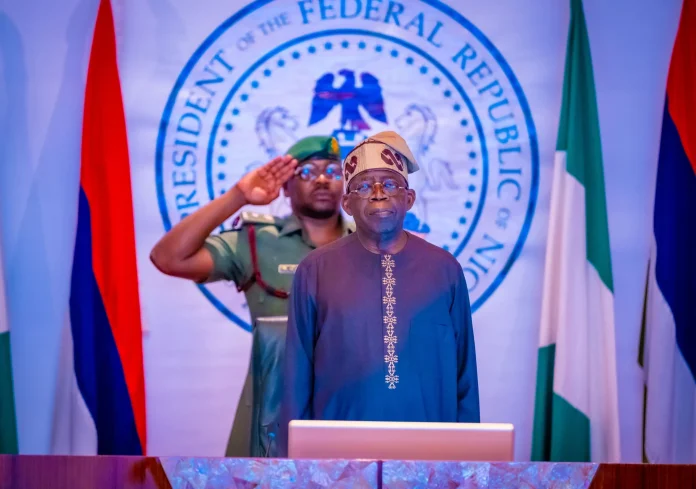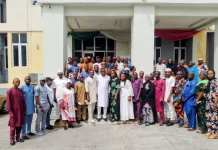President Bola Tinubu has reaffirmed his commitment to tax reforms and subsidy removal, emphasizing that these measures are critical for Nigeria’s economic transformation. Speaking during his first Presidential Media Chat aired on Nigerian Television Authority (NTA) on Monday, Tinubu stated that the tax reforms aim to eliminate outdated colonial-era structures in the nation’s tax system.
The tax reform bills have faced strong opposition, particularly in the North, prompting the House of Representatives to postpone discussions initially slated for December 3. The delay came after 73 northern lawmakers and the 19 northern state governors expressed concerns about the potential impact of the reforms. While some stakeholders in the South view the reforms as a step toward equitable resource distribution, resistance in the North reflects fears of marginalization and economic setbacks.
Governor Babagana Zulum of Borno State criticized the accelerated process of the reforms, comparing it to the decades-long deliberation of the Petroleum Industry Bill. In an interview with the BBC, Zulum cautioned against rushing the legislation, stressing the importance of careful consideration for long-term benefits.
The reform package, transmitted to the National Assembly on September 3, 2024, includes four bills recommended by the Presidential Committee on Fiscal and Tax Reforms, led by Taiwo Oyedele. These bills aim to modernize Nigeria’s tax system and enhance revenue collection. Notable among them are the Nigeria Tax Bill 2024 and the Tax Administration Bill, which provide frameworks for tax policy and dispute resolution.
Despite pushback, including calls from the Northern Governors Forum to revise the Value Added Tax (VAT) sharing template, President Tinubu remains resolute. He described the reforms as “pro-poor,” designed to widen the tax net while exempting vulnerable groups.
“Tax reform is essential. We can’t rebuild this economy using outdated tools. The goal is to create a larger economic ‘cake’ for everyone to share. Resistance is inevitable, but leadership demands decisive action,” Tinubu said.
On the controversial removal of petrol subsidies, the President expressed no regret, describing it as a necessary decision to prevent financial ruin. He rejected calls for a phased removal, emphasizing the urgency of fiscal discipline.
“We were spending beyond our means and mortgaging our future. The subsidy was unsustainable, benefiting smugglers and neighboring countries at Nigeria’s expense,” he explained. “This reform ensures we invest in our future rather than waste resources on giveaways.”
Tackling Inflation and Economic Growth
Tinubu outlined his administration’s strategy to reduce inflation from 34% to 15% by 2025, focusing on boosting local production and minimizing imports. He highlighted plans to support farmers, improve security, and enhance local manufacturing to achieve these goals.
“If we produce more locally and limit imports, we can stabilize prices. Investments in agriculture and local industries are pivotal,” he noted.
Addressing Stampedes and Social Issues
The President also addressed recent tragedies involving stampedes at palliative distribution events, which claimed several lives across Ibadan, Abuja, and Okija. Tinubu blamed poor organization and called for stricter discipline in managing such activities.
“These incidents reflect broader societal challenges, including impatience and poor planning. We must learn from these mistakes to avoid future tragedies,” he said, offering condolences to affected families.
Anti-Corruption Efforts
Tinubu highlighted ongoing anti-corruption initiatives, citing the removal of fuel subsidies and the recovery of ill-gotten assets, including properties linked to former officials. He stressed the importance of transparency and fair wages as tools to combat corruption.
“Our anti-corruption measures are yielding results. Increasing the minimum wage and improving state allocations are part of our strategy to reduce financial desperation,” Tinubu stated.
He also pointed to the implementation of the Student Loan Scheme as a means to alleviate financial burdens and discourage corrupt practices.
No Plans to Shrink Cabinet
Despite economic challenges, Tinubu defended the size of his cabinet, stating that Nigeria’s vast size and complexity require diverse expertise. He emphasized efficiency and effectiveness as key metrics for evaluating appointees.
Tinubu concluded by reaffirming his administration’s commitment to boosting agricultural production and increasing food supply to stabilize prices.
“I don’t believe in price controls. Our focus is on increasing supply to meet demand, ensuring food security for all Nigerians,” he said.













